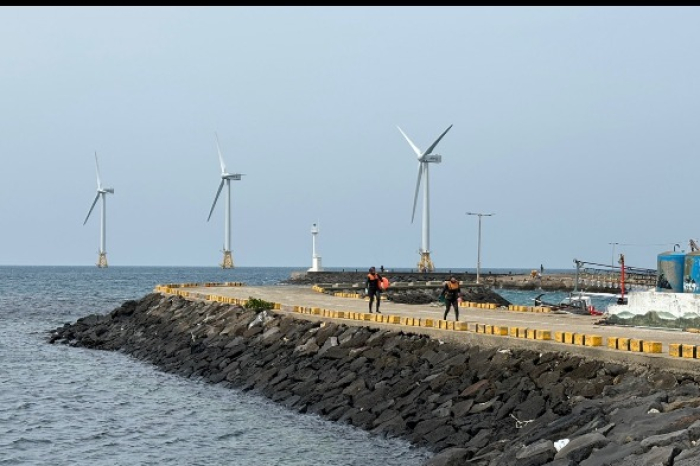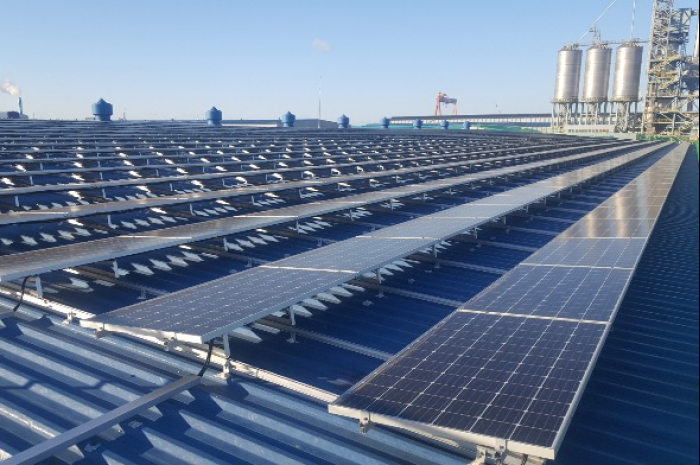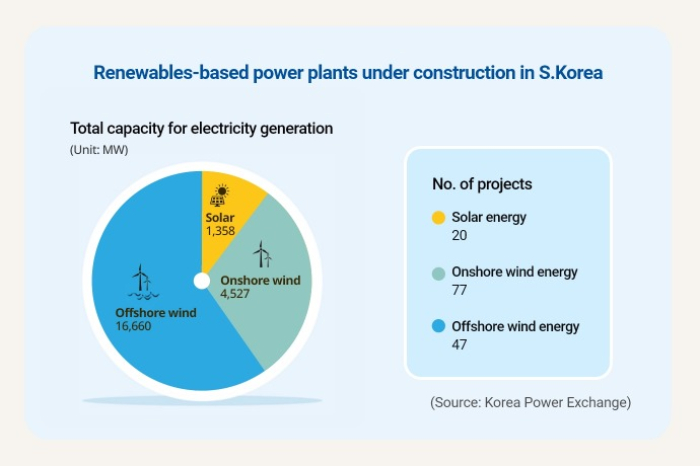Energy
Growing controversy over call to share profits for using wind energy
Provinces and towns in Korea are demanding energy firms pay contributions to use local renewable energy to generate power
By Apr 16, 2024 (Gmt+09:00)
4
Min read
Most Read
LG Chem to sell water filter business to Glenwood PE for $692 million


KT&G eyes overseas M&A after rejecting activist fund's offer


Kyobo Life poised to buy Japan’s SBI Group-owned savings bank


StockX in merger talks with Naver’s online reseller Kream


Meritz backs half of ex-manager’s $210 mn hedge fund



Renewable energy companies in South Korea are facing growing pressure to share their profits from wind or solar energy electricity generation, stirring concerns that it might deter private energy businesses from investing in renewable energy production in the country.
According to sources in related government agencies on Sunday, the Gangwon State Government and Korea’s Ministry of Trade, Industry and Energy recently discussed a revision in the state’s special law mandating that private energy companies share profits from generating electricity with renewable energy resources, mostly wind, in the area.
The law amendment aims to set up a public fund that collects profits from private renewable energy businesses that use wind, a public good abundant in the mountainous province on the east coast of Korea, as an energy resource in hopes of improving the community's acceptance of clean energy and generating handsome public income.
But the industry ministry is said to have opposed the Gangwon state’s idea, saying that the new law would rather slow the expansion of renewable energy use by shooing away private businesses seeking reasonable returns from costly investments in renewables-based power generation projects.
Despite the opposition, more provincial governments and townships in Korea are expected to look into various options to allow them to mandate renewable energy companies to share profits for using wind or solar energy available across the country.
EXTRA INCOME
Jeju Island, Korea’s largest island and the country's most popular resort destination, has been collecting contributions from an offshore wind farm, Tamra Offshore Wind Power Co. invested in by Hanwha Asset Management Co. and operated by Korea South-East Power Co.
According to a Jeju Special Self-Governing Province’s special law, any entity operating windmills on the island – both onshore and offshore – is required to contribute 17.5% of its annual net profit to the province’s wind energy public fund.
Tamra Offshore is estimated to have paid about 1.3 billion won ($951,000) to the fund in 2023 after earning 7.7 billion won in net profit the previous year.
Welcoming such extra income, the Jeju provincial government is seeking to issue an ordinance to set up a similar public fund to collect additional contributions from solar energy farm operators.

Shinan County in South Jeolla Province is another area in Korea that has been forcing private companies to pay for using renewable energy resources to generate power.
Any solar power farm in the county must contribute about 30% of its profit to the so-called "Sunshine Pension," according to a related ordinance. It collected 10 billion won for the pension as of the end of 2023.
Korea’s Board of Audit and Inspection has ruled that the county’s ordinance lacks a legal basis and delivered an opinion suggesting the county amends or revokes the ordinance because it impairs the profit of a private business.
But instead of following the recommendation, the county is seeking to require even wind farm operators to contribute to similar public funds, which could affect other companies at home and abroad seeking to run wind power plants in Shinan, including SK E&S, an energy unit of SK Group, and Denmark's Copenhagen Infrastructure Partners.
Other provinces such as Taean County in South Chungcheong Province with many renewables-based power generation facilities are actively seeking to follow Shinan and Jeju.
Korea's opposition party Democratic Party with its legislative majority has also pledged to set up similar funds by collecting contributions from renewables-based energy companies.
BLOW TO MAJOR RENEWABLE ENERGY PROJECTS
The latest trend of mandating a private renewable energy firm’s profit-sharing, however, bodes ill for upcoming major renewables-based energy projects in Korea, mainly focusing on large-scale offshore wind farms for which demand is rapidly growing, industry experts argued.

As of the end of last year, offshore wind parks accounted for 73.9% of a total capacity of 22,545 megawatts (MW) to be generated by renewables-based power plants under construction in Korea. That is equivalent to 12 nuclear power plants, each with a capacity of 1.4 gigawatts.
The bigger the electricity generation, the greater the investment, which also means a likely increase in private energy companies’ resistance to profit-sharing.
Concerns are growing that provincial or city governments’ attempts to require energy firms to share profits in return for approving renewable energy projects could cause an international trade dispute over Korea’s largest offshore wind farm project off the Chuja Islands, near Jeju Island, which is projected to cost about 18 trillion won.
Norway’s state-owned energy company Equinor holds a 100% stake in the project.
A government or public office’s attempt to control the use of wind or sunshine, which many people can consume without restricting its availability to others, would violate the Constitution, warns Professor Emeritus Kim Hyung-sung at Sungkyunkwan University’s School of Law.
“It restricts the freedom to conduct a business,” said Kim.
Write to Han-Shin Park and Jung-hwan Hwang at phs@hankyung.com
Sookyung Seo edited this article.
More to Read
-
 EnergyHyundai Engineering to produce offshore wind power on Chuja Islands
EnergyHyundai Engineering to produce offshore wind power on Chuja IslandsSep 01, 2023 (Gmt+09:00)
1 Min read -
 Korean InvestorsRenewables emerge as LPs' top infrastructure sector
Korean InvestorsRenewables emerge as LPs' top infrastructure sectorMay 03, 2022 (Gmt+09:00)
3 Min read -
 EnergySK Ecoplant joins 2.6GW offshore wind power project in Korea
EnergySK Ecoplant joins 2.6GW offshore wind power project in KoreaSep 06, 2022 (Gmt+09:00)
1 Min read -
 Carbon neutralitySoaring renewable energy costs haunt top Korean firms
Carbon neutralitySoaring renewable energy costs haunt top Korean firmsJul 26, 2022 (Gmt+09:00)
3 Min read -
 EnergyKorea to require power plants to use more renewable energy resources
EnergyKorea to require power plants to use more renewable energy resourcesOct 07, 2021 (Gmt+09:00)
3 Min read -

-
 Carbon neutralityDenmark’s Orsted to build world’s biggest wind farm off S.Korean coast
Carbon neutralityDenmark’s Orsted to build world’s biggest wind farm off S.Korean coastNov 24, 2020 (Gmt+09:00)
2 Min read
Comment 0
LOG IN


